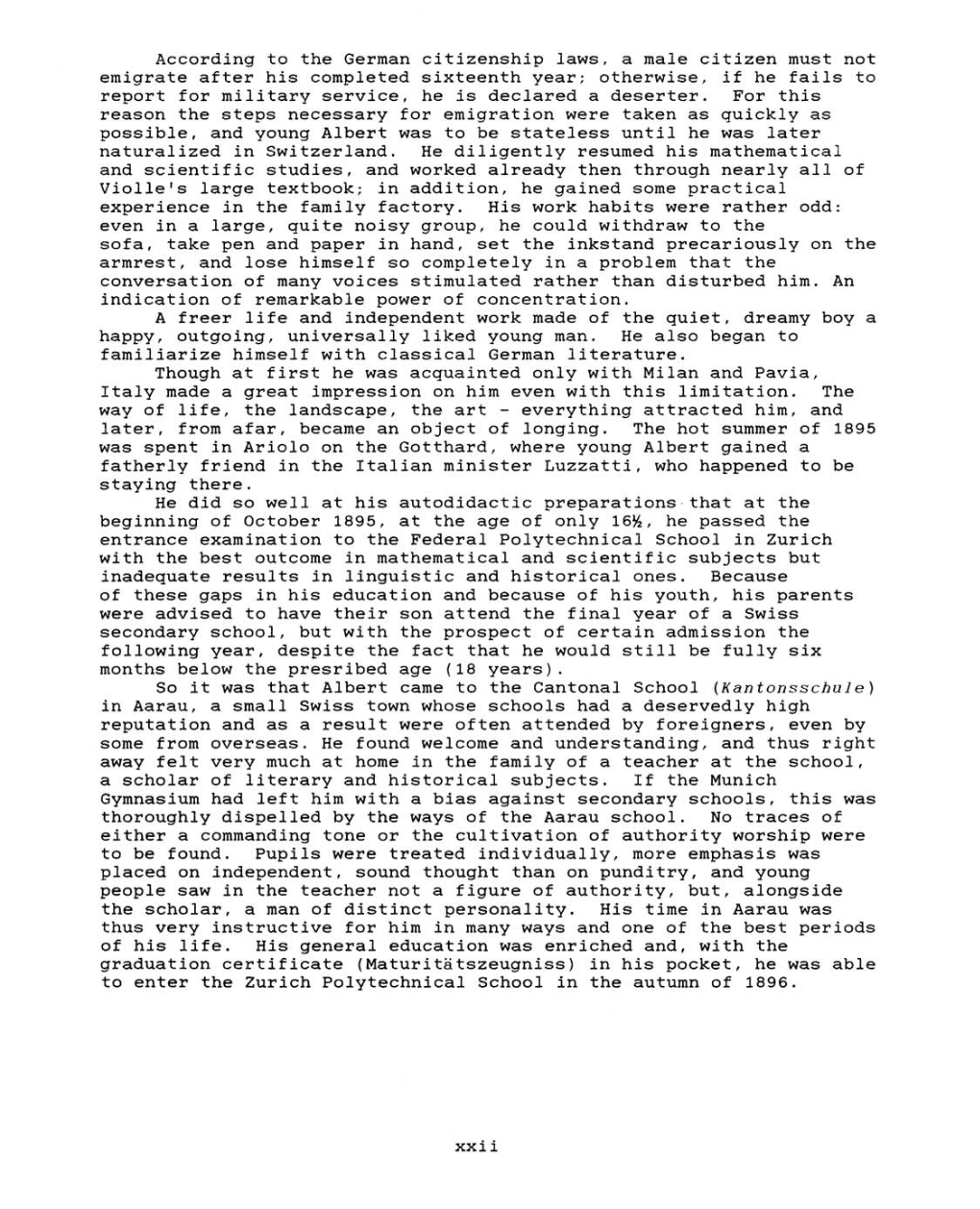According
to
the German citizenship laws,
a
male citizen
must not
emigrate after his completed sixteenth
year;
otherwise, if he fails
to
report for military service, he is declared
a
deserter. For this
reason
the
steps
necessary
for
emigration
were
taken
as
quickly
as
possible,
and
young
Albert
was
to
be stateless until he
was
later
naturalized in Switzerland. He
diligently
resumed his mathematical
and scientific studies, and worked already then through nearly all of
Violle's large textbook; in addition, he
gained
some
practical
experience
in the
family factory.
His work habits
were
rather odd:
even
in
a
large, quite noisy
group,
he could withdraw to the
sofa, take
pen
and
paper
in hand,
set
the inkstand precariously
on
the
armrest,
and lose himself
so
completely
in
a
problem that the
conversation of
many
voices stimulated
rather
than disturbed
him.
An
indication of remarkable
power
of concentration.
A
freer life and
independent
work made of the
quiet, dreamy boy
a
happy, outgoing, universally
liked
young
man.
He
also
began
to
familiarize himself with classical
German
literature.
Though at first he
was
acquainted only with Milan and Pavia,
Italy made
a
great impression
on
him
even
with this limitation. The
way
of
life,
the
landscape,
the art
-
everything
attracted
him, and
later, from afar, became
an
object
of
longing.
The hot
summer
of 1895
was
spent in Ariolo
on
the Gotthard, where
young
Albert
gained
a
fatherly friend in the Italian minister Luzzatti, who happened to be
staying there.
He
did
so
well
at
his autodidactic preparations that
at
the
beginning
of October 1895, at the
age
of
only
161/2,
he
passed
the
entrance examination
to
the Federal
Polytechnical
School in Zurich
with the best
outcome
in mathematical and scientific
subjects
but
inadequate results in
linguistic
and historical
ones.
Because
of these
gaps
in his education and because of his youth, his parents
were
advised
to
have their
son
attend the final
year
of
a
Swiss
secondary school, but with the prospect
of
certain
admission
the
following
year,
despite
the fact that he would still be
fully
six
months below the presribed
age
(18
years).
So
it
was
that Albert
came
to the Cantonal School
(Kantonsschule)
in
Aarau,
a
small Swiss town whose schools had
a
deservedly high
reputation
and
as a
result
were
often attended
by foreigners,
even
by
some
from
overseas.
He found welcome and
understanding,
and thus
right
away
felt
very
much
at
home in the family of
a
teacher
at
the school,
a
scholar of literary and historical subjects. If the Munich
Gymnasium had left him with
a
bias against secondary schools, this
was
thoroughly dispelled by the
ways
of the
Aarau
school.
No traces
of
either
a
commanding
tone
or
the cultivation of
authority worship
were
to be found.
Pupils
were
treated
individually,
more
emphasis
was
placed
on
independent,
sound
thought
than
on
punditry,
and
young
people
saw
in the teacher not
a
figure
of
authority,
but,
alongside
the scholar,
a man
of distinct personality. His time in Aarau
was
thus
very
instructive for him in
many ways
and
one
of the best periods
of his life. His general education
was
enriched and, with the
graduation
certificate
(Maturitätszeugniss) in
his
pocket, he
was
able
to
enter
the
Zurich Polytechnical
School in the
autumn
of
1896.
xxii
